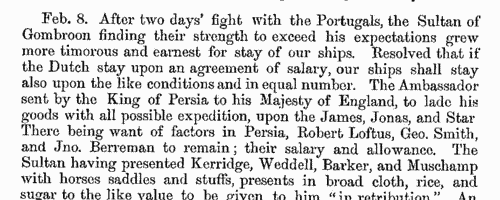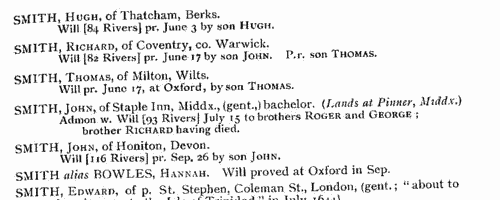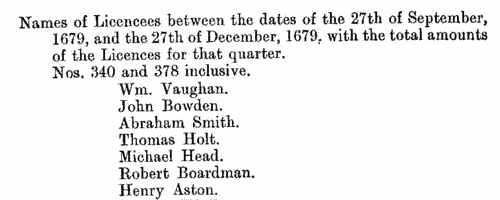British in the East
(1625-1629)
The East India State Papers centre on the records of the East India Company, trading to India, the East Indies, Persia and China. They include the Court Minutes of the East India Company.THRING. Cost: £4.00.  | Sample scan, click to enlarge

|
PCC Probates and Administrations
(1645)
The Prerogative Court of Canterbury's main jurisdiction was central and southern England and Wales, as well as over sailors &c dying abroad: these brief abstracts, compiled under the title "Year Books of Probates", and printed in 1906, usually give address, date of probate and name of executor or administrator. They are based on the Probate Act Books, cross-checked with the original wills, from which additional details are, occasionally, added. The original spelling of surnames was retained, but christian and place names have been modernised where necessary.THRING. Cost: £2.00.  | Sample scan, click to enlarge

|
PCC Probate Abstracts
(1650-1651)
The Prerogative Court of Canterbury's main jurisdiction was central and southern England and Wales, as well as over sailors &c dying abroad: these brief abstracts usually give address, date of probate and name of executor or administrator
THRING. Cost: £2.00.  | Sample scan, click to enlarge

|
PCC Probate Abstracts
(1652-1653)
The Prerogative Court of Canterbury's main jurisdiction was central and southern England and Wales, as well as over sailors &c dying abroad: these brief abstracts usually give address, date of probate and name of executor or administrator
THRING. Cost: £2.00.  | Sample scan, click to enlarge

|
Official Papers
(1655-1656)
The State Papers Domestic cover all manner of business relating to Britain, Ireland and the colonies, conducted in the office of the Secretary of State as well as other miscellaneous records. These records are from November 1655 to June 1656: there is also a set of abstracts of navy correspondence.
THRING. Cost: £4.00.  | Sample scan, click to enlarge

|
Letters and papers of James first duke of Ormond, Lord Deputy of Ireland
(1675-1685)
This correspondence deals with a large variety of personal and public affairs in Ireland and England. The collection also includes lists of Irish wool licences and licencees, 1678 to 1681THRING. Cost: £4.00.  | Sample scan, click to enlarge

|
Inhabitants of Salisbury
(1443-1704)
A collection of transcripts of churchwardens' accounts from the parishes of St Edmund and St Thomas in Sarum (Salisbury in Wiltshire) by Henry James Fowle Swayne, the Recorder of Wilton, was published by the Wilts Record Society in 1896. The greater part of these accounts relate to expenditure to workmen on the church fabric, and income for rent of pews and the tolling of bells and obsequies for parishioners. There are several sources covered: the churchwardens' accounts for St Edmund's for 1443 to 1461; for St Thomas's 1545 to 1690, and some notes from 1704; and accounts of the stewards of the Fraternity of Jesus Mass founded in St Edmund's.THRING. Cost: £4.00.  | Sample scan, click to enlarge

|
 Masters of Apprentices registered at Bristol in Gloucestershire
(1710-1712) Masters of Apprentices registered at Bristol in Gloucestershire
(1710-1712)
Apprenticeship indentures and clerks' articles were subject to a 6d or 12d per pound stamp duty: the registers of the payments usually give the master's trade, address, and occupation, and the apprentice's father's name and address, as well as details of the date and length of the apprenticeship. There are central registers for collections of the stamp duty in London, as well as returns from collectors in the provinces. These collectors generally received duty just from their own county, but sometimes from further afield. May 1710 to January 1712. For some reason, the Bristol collector was the only one in the country to make his return in Latin. (The sample entry shown on this scan is taken from a Shropshire return)THRING. Cost: £8.00.  | Sample scan, click to enlarge

|
 Apprentices registered at Southampton in Hampshire
(1712-1713) Apprentices registered at Southampton in Hampshire
(1712-1713)
Apprenticeship indentures and clerks' articles were subject to a 6d or 12d per pound stamp duty: the registers of the payments usually give the master's trade, address, and occupation, and the apprentice's father's name and address, as well as details of the date and length of the apprenticeship. There are central registers for collections of the stamp duty in London, as well as returns from collectors in the provinces. These collectors generally received duty just from their own county, but sometimes from further afield. January 1712 to June 1713. (The sample entry shown on this scan is taken from a Norfolk return)THRING. Cost: £8.00.  | Sample scan, click to enlarge

|
 Apprentices registered at Westbury in Wiltshire
(1713-1715) Apprentices registered at Westbury in Wiltshire
(1713-1715)
Apprenticeship indentures and clerks' articles were subject to a 6d or 12d per pound stamp duty: the registers of the payments usually give the master's trade, address, and occupation, and the apprentice's father's name and address, as well as details of the date and length of the apprenticeship. There are central registers for collections of the stamp duty in London, as well as returns from collectors in the provinces. These collectors generally received duty just from their own county, but sometimes from further afield. July 1713 to April 1715. (The sample entry shown on this scan is taken from a Norfolk return)THRING. Cost: £8.00.  | Sample scan, click to enlarge

|
Research your ancestry, family history, genealogy and one-name study by direct access to original records and archives indexed by surname.













